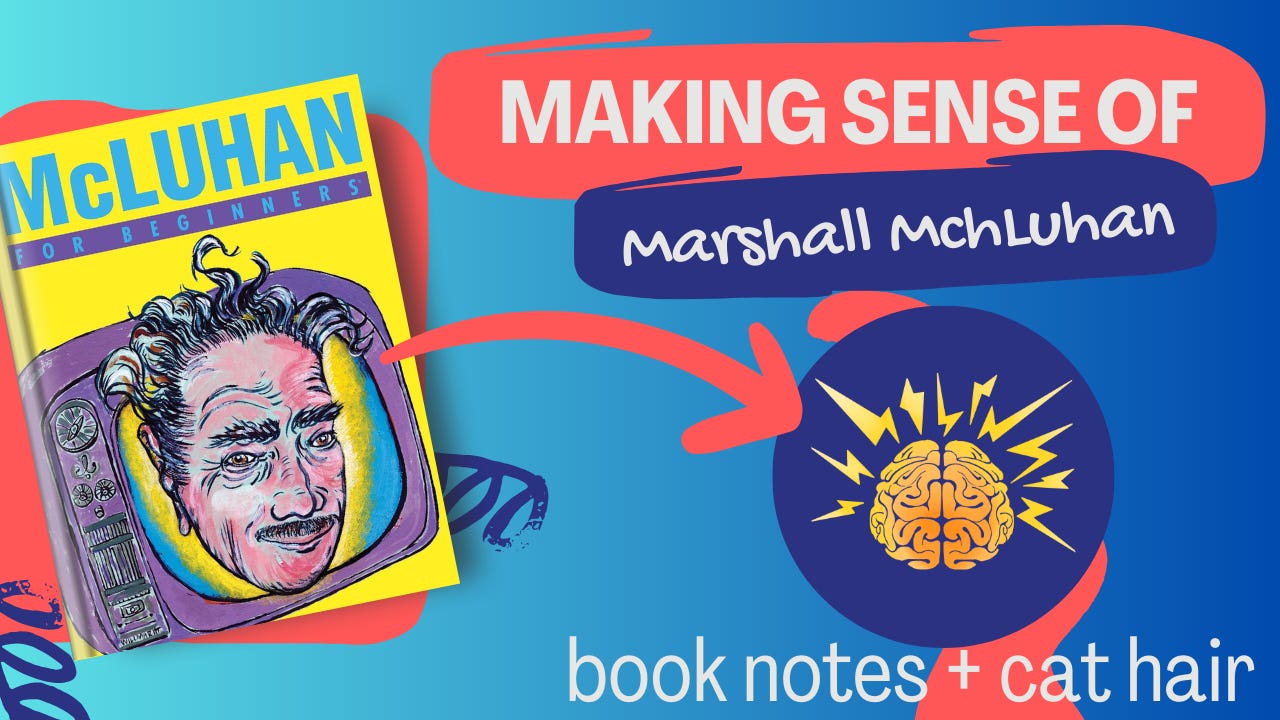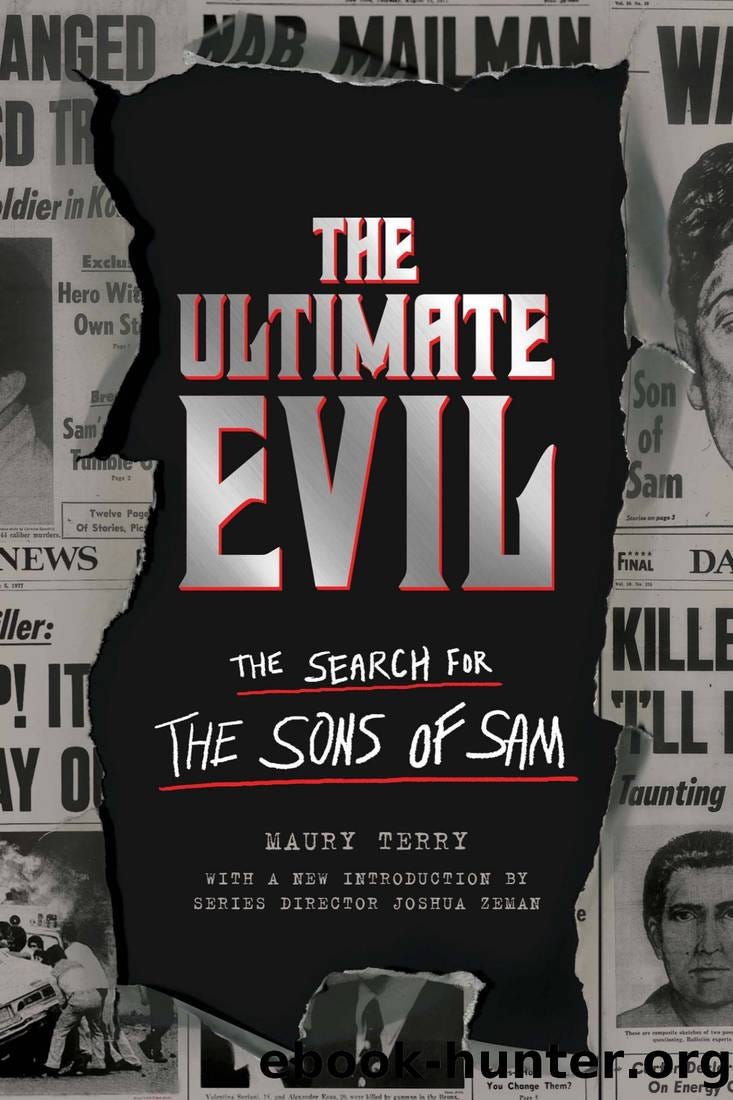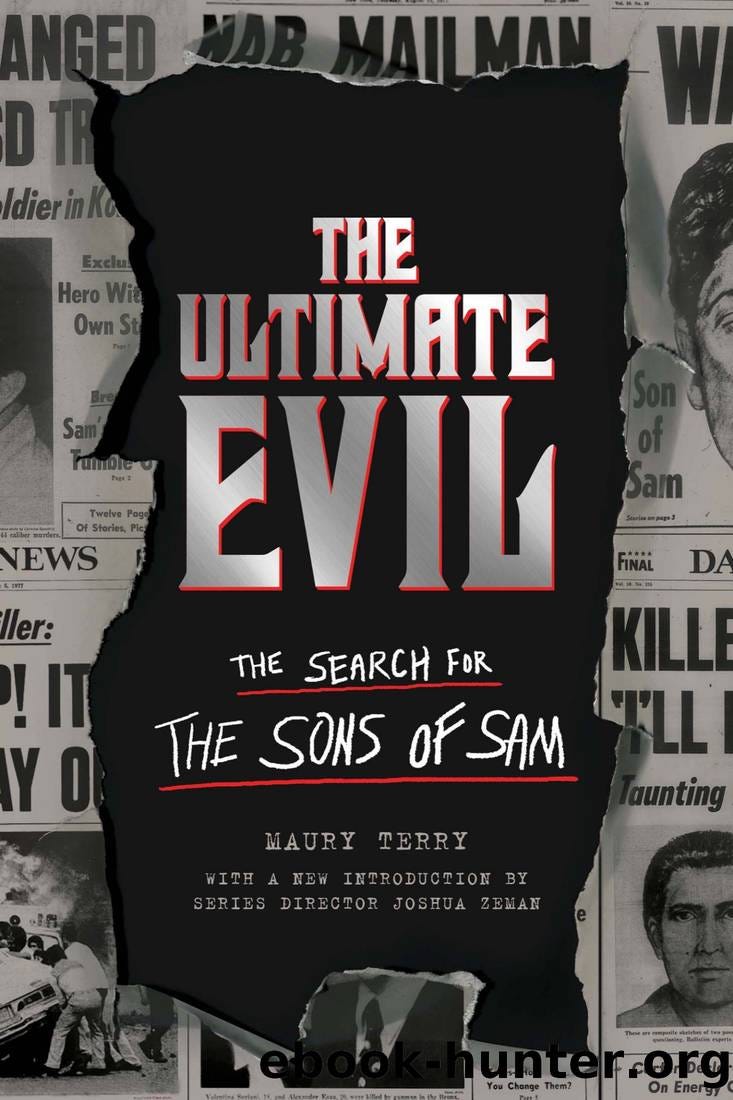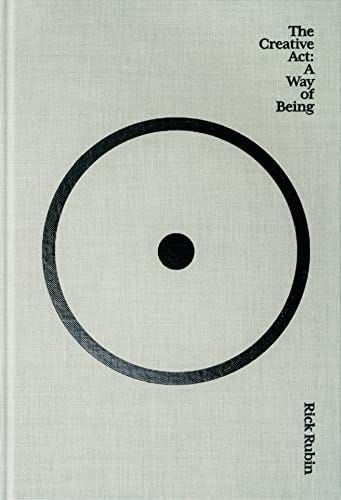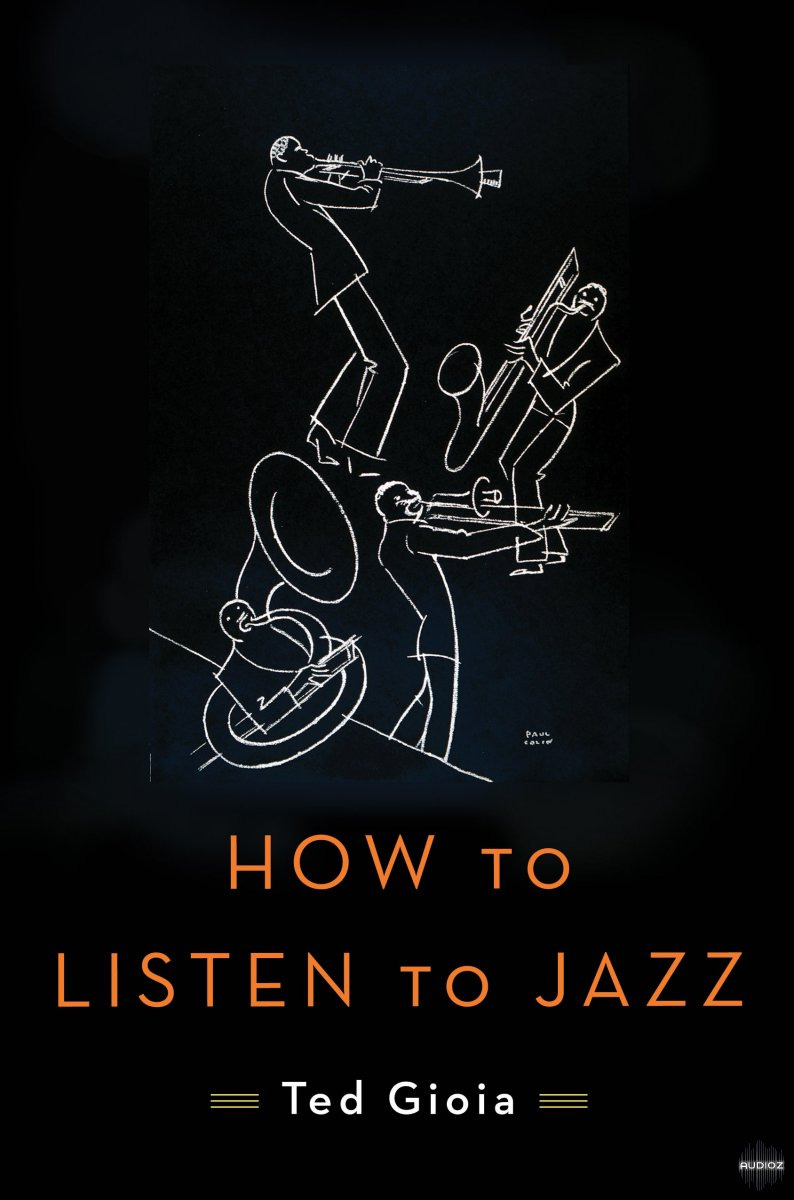Discover Read or Die a Slave: Rough Drafts
Read or Die a Slave: Rough Drafts

Read or Die a Slave: Rough Drafts
Author: Chad "Curly" Hall
Subscribed: 229Played: 831Subscribe
Share
© Chad Hall
Description
481 Episodes
Reverse
Is the Medium Really the Message? Notes and reflections on McLuhan For Beginners.📚 Buy this book: Marshall McLuhan for BeginnersIf you use my links to buy your books, I’ll get a kick back from Amazon, Jeff Bezos will make a little less money, and it won’t cost you a cent. 🤫------------------------------This episode is available as podcast and video (on Substack & YouTube.) Get full access to Read or Die A Slave at readordieaslave.substack.com/subscribe
If you’re listening to this in the podcast feed, I recommend going to Substack and watching the video. Here are the books:* How the World Ran Out of Everything Peter S. Goodman* The Lost City of the Monkey God Douglas Preston* 1Q84 Haruki Murkami* Small Giants Bo Burlingham* The Smoking Diaries Simon Gray* Homogenic Emily Mackay* Pretty Hate Machine Daphne Carr* 69 Love Songs LD Beghtol* Swordfishtrombones David Smay* A System for Writing Bob Doto Get full access to Read or Die A Slave at readordieaslave.substack.com/subscribe
My notes and reflections to “How to Be Great? Just Be Good, Repeatably with Steph Smith” on David Perrell’s How I Write Podcast.Source:Full notes and quotes available for paying supporters. Get full access to Read or Die A Slave at readordieaslave.substack.com/subscribe
I've realized that I need to focus on creating content that truly inspires me and adds value to my life, rather than wasting time on social media platforms or mindless entertainment. To support this, I'm restructuring my creative process and consumption habits, prioritizing meaningful films and artistic pursuits over TV shows, and using Substack to share my ideas with those who are genuinely interested in my work. Get full access to Read or Die A Slave at readordieaslave.substack.com/subscribe
I've been reflecting on the balance between polished and raw content in my creative work. I'm considering challenging myself to create something every day, embracing both refined pieces and spontaneous expressions, to nurture my various creative interests and maintain a diverse output. Get full access to Read or Die A Slave at readordieaslave.substack.com/subscribe
Every month, my bank account sadly, whispers the same question: Is this the month your dreams drown?Refrigerator magnets and YouTube gurus will tell you to follow your passion and you'll never work a day in your life. But they fail to mention what it looks like when you don't get paid. That's the reality of pursuing creative endeavors: conflict. And conflict only increases each month driven by the same pressure that millions of people with "real jobs" feel, the pressure of financial stability.Can I make enough money to stay afloat?It’s a water level which consists of two invisibly thin lines: 1) having enough money to pay all that needs to be paid, and 2) receiving that money in time to pay what needs to be paid. I’ve been struggling with the second in secret for several years.There’s a certain level of performance involved in all creative online work. We generate holograms of our lives, digital myths spun from carefully curated moments. A girl transforms infrequent weekend getaways into the appearance of a jet-setting lifestyle, strategically dispensing travel photos throughout the year. Suddenly, her life looks like one continuous adventure. It’s almost an art—and, almost completely, b******t. But aren't we all guilty of this kind of performance to some degree? We delete. We edit. We filter, and we present versions of our lives that look nothing like the messy, mundane realities of them. We become avatars of ourselves.For years, I've been a character in my own fictions, fictions I wasn't even aware I was writing. The life that I presented was a canvas of carefully chosen omissions; a mastered craft of the partial truth, letting others fill in gaps. The assumptions made about my life were far more flattering than the reality ever was. It was a fiction written by what I left unsaid.This is how writers perform. We edit out the reality that most of us are struggling just to pay our internet bill.Every time I think about this, I think about a real estate agent I knew. As far as I could tell, she wasn't a very successful real estate agent. She just didn't sell many houses. But you'd never guess it from looking at her car. Every year, without fail, she'd be driving a brand new model. Her logic? "Can't look broke in front of clients." And you know what? She had a point. If your agent's car is worth less than your TV...I think, for writers, the pressure to project success has a less obvious link to motivation. It’s not a one-to-one relationship. There’s some hazy psychology mixed in like: “If I admit that most months I'm panicking about the due-dates of my bills, would anyone take me seriously?”The connection between financial stability and credibility isn't as clear as a realtor's justification for a new car. But it's there, constantly pushing. Maybe the whole thing is as simple as this: worrying about money makes me feel like a failure, and feeling like a failure makes it hard to confidently put my thoughts out into the world. And admitting these things publicly ties me to them. The reality becomes unavoidable. So maybe I do like pretending I’m more successful than I am.But feeling like a phony isn't even the worst part. It's the conflict this creates within me.There’s one side of me that sees my actual skills, and my talents as a path forward. The more I write, the more I put myself out there, the closer I get to the possibility of that becoming my career, which is the promise of sites like Substack and Beehiiv (and even X), isn’t it? Stick around long enough, improve, develop an audience, and build yourself a sustainable income.Then there’s the other side of me that feels the pressure of impending collapse. I’m holding it together now, but for how long? And is it even really in my control? I can do everything right. I can show up. I can do my work. I can pay my bills. And yet one thing, one late payment, one client who decides they’ll pay me after they come back from vacation–one small thing can create a chain reaction that will crumble everything.Adding to this pressure is the weight of family perception and image. The people closest to me do not understand the world we live in, they don’t understand how it’s changed since the 1950s, and how it’s continuing to change right now. To them, all of this online creative work isn't work - it's something I need to 'grow up' from. They see me as a child who never matured, because for them maturing means giving up on what you want, getting a job with good benefits, and suffering through it until you retire. To them I'm a fool and a waste of potential. And their judgment becomes yet another voice ringing in my ear and rattling around in my chest.All of this pressure manifests as a need to hurry up; to get there faster. Build faster. Write faster. Edit faster. Start more projects. Dump more projects. Switch from one thing to another. Pivot. Change. Make short videos. Optimize. Move quickly. Because in this frantic world standing still means your death.But writing is not a speed exercise. It doesn’t improve in a rush. The myth of Jack Kerouac writing On The Road in a benzedrine-fueled, three-week fury? It's just a myth. Sure, he did feed a 120-foot-long roll of teletype paper into his Smith Corona (the mad b*****d.) And he did bang out that first draft in three weeks. But that burst of words didn’t come out of empty air. It had been percolating for years, in his head, in his journals, in his conversations, unraveling itself on adventures from coast to coast. That scroll, impressive as it was, was also just the beginning. It took another six years of pruning and shaping before Kerouac's rabid American dream hit the shelves in 1957.Writing is often compared to gardening, and for good reason. Ideas, like seeds, need time to germinate. You can't rush them (annoying as it is.) A draft might come shooting out of the ground, seemingly out of nowhere, but unseen in the dirt it has been slowly taking root. A draft forms in the mind long before the fingers hit the keys.How do I rush something that dies at velocity?There are two impulses inside of me that at times feel like two people embroiled in an argument. One of them wants to cry, to scream, to punch something, and to fold under the weight. Because giving up can be a form of relief. The other voice, is stern, controlled, robotic, saying things like “Yes, that is a thing you are feeling.” It prefers less emotion. It does whatever is in front of it.Neither of these voices is the right voice. Neither is the one to listen to. They only offer reactions. And everything that I know is found in the charred, chaotic landscape that exists between the two.I know how to write. I know that exposing things to the light leads me somewhere—sometimes it leads only to the next draft or the next complete piece of writing, but that’s still somewhere. I know this path. It’s uncomfortable. It’s stressful. It wounds me. I doubt my abilities every day. And at times, I feel trapped. The only success that I’ve known on this path is the success of writing something and feeling like I’ve finished it. Nothing beyond that.I may never be able to pay my bills doing this. I may always feel the stress that pulls at me like the stress I feel now after 12 days of waiting for a late payment to arrive. My life may actually collapse one day. There’s no played-up drama to that. It may happen. That’s a true representation of my life. That’s a true representation of a conflict that may never go away.But, I show up. Not because I’m some superior person; some model of virtue. Not because it’s a clever thing to say and just another way to perform. I show up because I honestly have no idea what the f**k else to do. This is all that I’m truly good at.So, showing up is an act of hope. It’s also an act of desperation. But mostly, at its core, writing is an act of hope. Get full access to Read or Die A Slave at readordieaslave.substack.com/subscribe
I've come up with an idea for a podcast called "Rough Drafts" or "Brainstorms." The concept is to use the podcast as a platform to talk through various related ideas I have, without the pressure of immediately turning them into finished pieces. It's a way for me to verbally explore and develop my thoughts, with the possibility that they might eventually evolve into more polished work. This approach allows me to freely discuss my ideas while potentially creating content that could complement future written pieces. The podcast serves as both a brainstorming tool and a potential source of material for future projects. Get full access to Read or Die A Slave at readordieaslave.substack.com/subscribe
Partially a strategy for hustle-free yet consistent content creation and partially an update on where we are going with Read or Die a Slave.Don’t miss the newsletter poststhe Dispatches newslettermy X profileMy EDC Youtube channelMy Zettelkasten Youtube channel Get full access to Read or Die A Slave at readordieaslave.substack.com/subscribe
Have you ever thought about where the desire to continually buy more came from? Have you ever considered that it might have be purposefully designed? And to what purpose?Shop Class as Soulcraft Get full access to Read or Die A Slave at readordieaslave.substack.com/subscribe
Thoughts on being online less, dealing with the stimulation reduction, and finding ways to produce content from the activities I'm already doing.The links Get full access to Read or Die A Slave at readordieaslave.substack.com/subscribe
I took a break. Too much noise. Input overload was impeding my output. But it's not just too much stuff coming in, it's too much current media. I’m focusing on books and reducing podcasts. And more importantly, I'm focusing my reading toward a project goal.The Intellectual DevotionalDigital Minimalism Get full access to Read or Die A Slave at readordieaslave.substack.com/subscribe
How Much Should I Tell AI? Thoughts on Artificial Intelligence and privacy.Watch Video on XThe Age of AI & Our Human FutureThe thread of podcasts Get full access to Read or Die A Slave at readordieaslave.substack.com/subscribe
Interrogate Your Thoughts, Understand Why You Think What You ThinkWATCH ON X Get full access to Read or Die A Slave at readordieaslave.substack.com/subscribe
WATCH THE VIDEOGetting into more of Maury Terry’s book The Ultimate Evil. Is there a possible connection between the Son of Sam case and the case of the Long Island Serial Killer? Did Terry really get lost on the idea of a powerful cult/cabal or is it possible? Is there something strange happening on Long island?The Ultimate Evil Get full access to Read or Die A Slave at readordieaslave.substack.com/subscribe
Things piled up quicker that I thought. I have some thoughts about being active on X again. I also going to pretty intensive details about the daily page I've build in Tana (thank you Kam.) I'm getting tired of "optimizing everything so I'm finding ways of getting things done that don't involves lists, and stats, and tracking. I think I've fallen in love with voice transcription through Whisper and it's changing the way I journal and take book notes. Also, does anybody get the feeling that streaming is just turning back into overpriced cable (with even crappier content?)WATCH THE VIDEO Get full access to Read or Die A Slave at readordieaslave.substack.com/subscribe
In order to read Maury Terry's book The Ultimate Evil we need to talk about the word "satanic." It's a messy topic but an important distinction to make when we talk about true crime books that dip into the idea of satanic cults as this one does with the Son of Sam killings.The distinction is nudged at by Joshua Zeman in his excellent introduction to the reissue of the book, and I go as deep as I can on it.Video version on XThe Ultimate EvilDispatches From Creative Isolation: Changing My Mind By Dissecting My MindThe Satanic Panic and the Religious Battle for the ImaginationThe Sons of Sam: A Descent Into Madness Get full access to Read or Die A Slave at readordieaslave.substack.com/subscribe
...wherein I explain ways I'm changing my podcasting process, and a decent rant about why books matter to me and why exposure to ideas we disagree with is important.See the video version on X Get full access to Read or Die A Slave at readordieaslave.substack.com/subscribe
It's time to penetrate deep into the creative process. These are my extensive excavation notes on Rick Rubin's book, which is more meditative than instructive; more philosophic than analytic; more silent than deadly. It's the kind of book you pull off the shelf when you've hit a creative block so that Rick Rubin can whisper the names of his favorite fruit into your ear.The Creative ActSteven Pressfield on TetragrammatonTarot and the Law of Cycles by Mitch HorowitzBig Magic by Elizabeth GilbertThe War of Art by Steven PressfieldKevin Kelly on How I WriteThe Victorian Internet episodeNebraska by Bruce SpringsteenHomicide: Life on the StreetThe Outsider by Colin WilsonThe Dip episodeGetting Things Done by David AllenBenjamin Franklin episode“When Dove Cry” by PrinceThe Writing Life by Annie DillardStripped documentaryCheckout the full list of books so far.Don’t forget to go subscribe to my deconstructionist fiction project: The Thing That Devours EverythingGo down the nerdy rabbit hole with Digital Disaster@curlygruene on X Get full access to Read or Die A Slave at readordieaslave.substack.com/subscribe
New Year impending doesn't always have to mean an existential crisis (unless we're talking about the number of cookies I'm about to eat in the next week despite my desire not to eat a truck load of cookies.) I love audio (not video) and I think it's damn well time the dispatches went audio. It's all about honesty, immediacy, and cat farts from here on out. Back went old mfrs like me were young, everybody had answering machines that looked like wooden playstations. The best were the ones with actually reel to reel tape inside them because you could just call your friends in the middle of the night when they aren't at home and leave these long messages telling them everything on your mind and just eating up that tape. And it wouldn't cut you off. That's what I'm just done to you, and with every episode going further. No show. Just eating up the tape. Get full access to Read or Die A Slave at readordieaslave.substack.com/subscribe
Punk rock was never as punk rock as jazz. It was a middle finger and a damn good time. But jazz is intimidating (and sometimes pretentious in modern times) we need bridge or maybe just a cracked window so we can here those sweet sweet horns. Jazz is cool, ya dig?How To Listen To JazzThe Honest Broker (Ted’s Substack)Don’t forget to go subscribe to my deconstructionist fiction project: The Thing That Devours EverythingGo down the nerdy rabbit hole with Digital Disaster@curlygruene on XAnd if you’re just a little bit curious to see if my newsletter sucks ass or not… Get full access to Read or Die A Slave at readordieaslave.substack.com/subscribe
Comments
Top Podcasts
The Best New Comedy Podcast Right Now – June 2024The Best News Podcast Right Now – June 2024The Best New Business Podcast Right Now – June 2024The Best New Sports Podcast Right Now – June 2024The Best New True Crime Podcast Right Now – June 2024The Best New Joe Rogan Experience Podcast Right Now – June 20The Best New Dan Bongino Show Podcast Right Now – June 20The Best New Mark Levin Podcast – June 2024
 United States
United States




